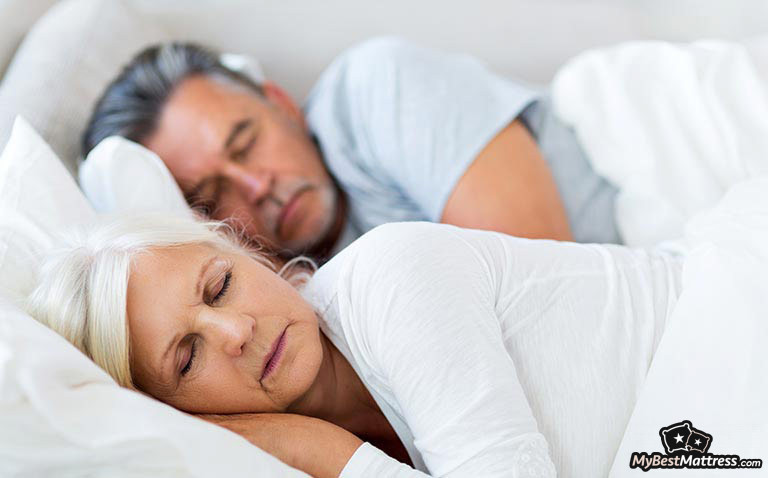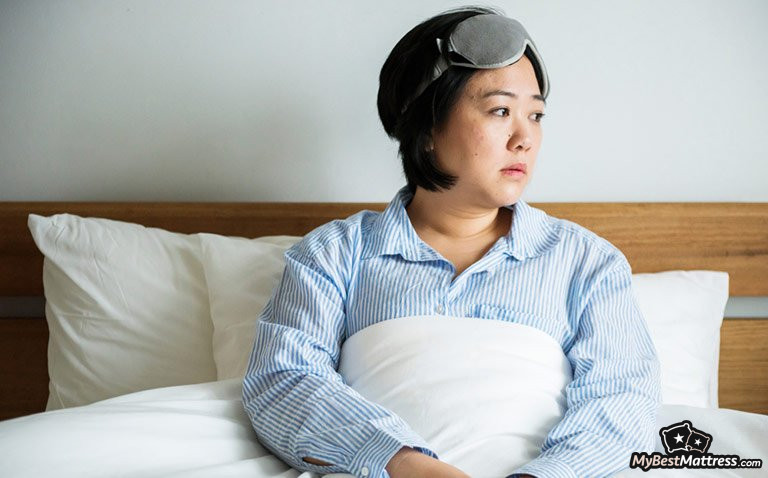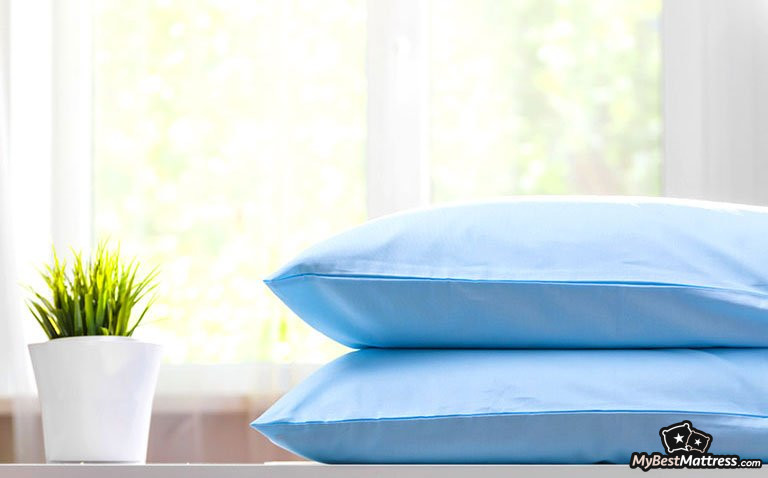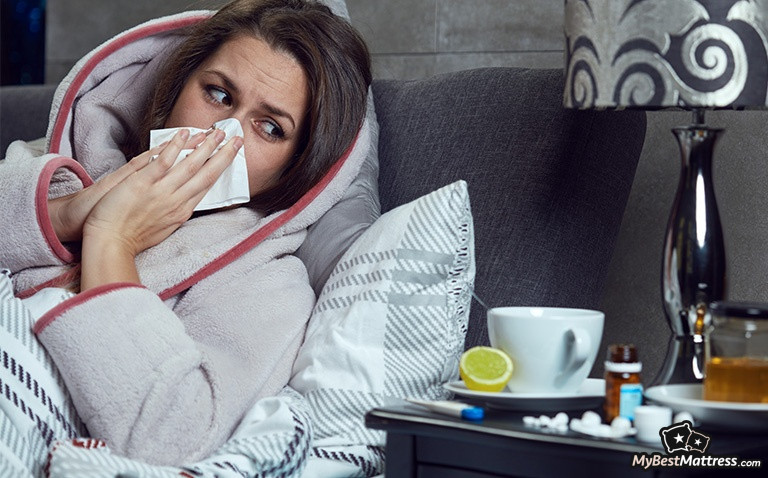
Stuffy nose, head seemingly full of lint, and aches and pains all over your body - sleeping when you have a cold has never been easy, even though having enough rest is crucial if you want to get better quickly. Ironic, right? But as important as sleep is while sick, does anyone actually know how to sleep with a cold?
It can often seem like a cruel joke when you’re trying to sleep a cold off and it is doing everything it can to keep you awake, thinking “I have a cold and I can't sleep” and trying to finally doze off throughout the night.
From coughing fits to your nose clogging back up as soon as you lay back down after blowing it, it seems to never end. And yet there’s no way around it. Sleep is a crucial part of quickly fighting off that bug.
But what can you do to beat the system and finally have a good night’s rest while down with a cold? From traditional herbal remedies to unusual tips and tricks, everything you need to know about sleeping with a cold is revealed in one article.
Table of Contents
- 1. How to Sleep With A Cold - Why Is It So Difficult?
- 1.1. The Cold Itself
- 1.2. Hormones
- 1.3. Fewer Distractions
- 2. COVID-19 And Sleep
- 3. How to Sleep With A Cold - Best Tips
- 3.1. Keep Yourself Warm
- 3.2. Stay Well Hydrated
- 3.3. Find a Good Sleeping Position
- 3.4. Over-the-counter Remedies
- 3.5. Don’t Pressure Yourself
- 4. How to Sleep With A Cold - Top Alternatives
- 4.1. Comfortable Bed
- 4.2. Peaceful Environment
- 5. Conclusions
How to Sleep With A Cold - Why Is It So Difficult?
“I have a cold and I can’t sleep” is a sentence we’ve all uttered or at least heard someone else say countless times.
We all know that figuring out how to sleep with a cold can be quite the challenge - every night you toss and turn trying to find out a pose that will alleviate the discomfort, only for the next night to arrive and have us go through all that effort again.
Even though it seems like the exhaustion and our bodies craving some rest so that the healing processes could kick in should knock us out for days at a time, it more often than not ends up as the exact opposite.
The Cold Itself
When we’re down with a cold our bodies go through a lot of discomfort. One of the biggest and most common culprits of sleepless nights is coughing. Whether it’s a dry or a wet cough, laying down for the night often makes it much worse, as our airways become even more constricted due to gravity, encouraging coughing even more.

Even if we manage to doze off while sick, coughing can wake us up many times during the night, not only keeping us from getting enough sleep but lowering its quality as well.
In addition, a congested nose can hinder breathing not only while awake but in bed, too. This oftentimes makes us breathe through our mouths, which can irritate the already sore airways, causing us to cough even more and jolt out of the delicate state of early sleep.
This can be remedied with nasal sprays which can alleviate congestion, which can prevent coughing fits, and allow you to fall asleep easier. That being said, quick, one-time fixes don’t solve the problem completely, as congestion can come back at night and wake you up with a nasty cough.
It admittedly can be very frustrating, as it often seems like your body is stopping you from giving it the one thing it’s craving the most - restful sleep. However, there are some deeper reasons that make the question “how to sleep with a cold” much more difficult to answer.
Latest Saatva Coupon Found:
UP TO $500 OFF
Limited-time Saatva Sale
We're sharing a limited-time Saatva mattress discount with our readers! Grab this deal & enjoy your new mattress with huge discounts.
Hormones
We, humans, are wired to operate according to a 24-hour inner clock, also known as our circadian rhythm. This is what keeps us awake during the day and makes us drowsy during the night.
This cycle is very closely linked to the fluctuation of various hormones throughout the day, however, the most important to learn how to sleep with a cold is cortisol. Made by the adrenal glands, cortisol helps regulate blood sugar levels, metabolism, and blood pressure. It also helps the body manage stress.
Additionally, cortisol is also responsible for keeping our immune system in check and helping fight off inflammation. At night, cortisol levels drop, no longer suppressing our immune system, which kicks it into overdrive if there’s a bug or inflammation in our body.
This leads to symptoms getting much worse, such as fever jumping up, chills running down your body, sweating, and even worsened congestion - and we already know how annoying this can be while trying to sleep with a cold.

Did you know?
Have you ever wondered which mattresses are approved as the best for sleep?
See & compare TOP mattresses side by sideFewer Distractions
This might seem a little too simple of a reason to even include, but have you ever noticed that keeping yourself busy helps a headache or sore throat go away quicker? Well, the same can be applied to sleeping with a cold.
During the day we tend to focus on various tasks - even though we often should be resting - keeping our minds busy focusing on things other than being sick. But when nightfall comes and we are left alone in peace and quiet, there aren’t any distractions that could help us forget the stuffy nose and annoying cough.
The symptoms don’t even need to be much worse than they were during the day, but as our brains tend to search for something to focus on, the cold usually ends up front and center on our minds and making sure that all of our efforts to fall asleep are fruitless.
As you can see, there are many factors that can make falling asleep while sick unfairly difficult. As ironic as it is, the cold and similar viral infections require a lot of rest to properly clear up, and we usually end up searching far and wide for something to make the symptoms at least a little bit more bearable.
COVID-19 And Sleep
As the world continues fighting the COVID-19 pandemic, more and more new symptoms are being added to the list. However, one of the more unusual side effects of Coronavirus is definitely the unexpected and unusual changes many people notice in their sleep patterns[1].
Most notably, many have reported having trouble falling asleep at their usual bedtime, getting up several times throughout the night, and even waking up hours earlier than usual and not being able to fall back asleep.
Though these shifts can be seen as a mysterious symptom of the already infamous virus, most of these sleep disturbances can be attributed to the anxiety many of us have felt regarding the pandemic. Not knowing if you will get sick or, if you’ve already been infected, whether your condition will worsen or not, can keep anyone up throughout the entire night.
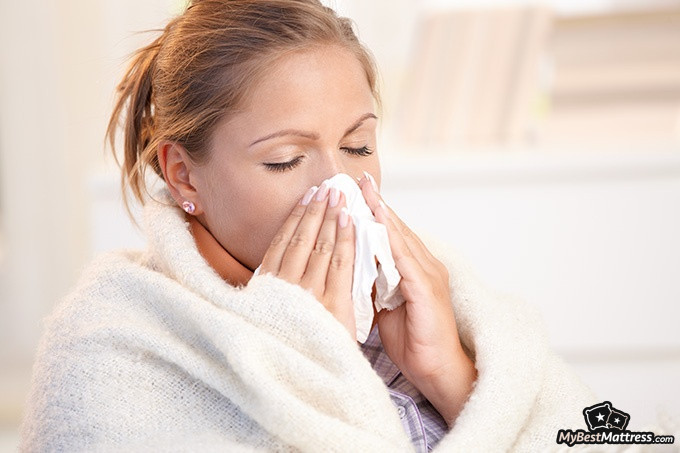
Additionally, it’s important to remember that the most common COVID-19 symptoms are very similar to those of a common cold or the flu. And we already know that an annoying dry cough, fever, and an aching body are not the best for a peaceful night of sleep.
Another thing worth considering is that our lives being flipped upside down thanks to quarantine could have affected our natural sleep rhythms as well. Spending more time inside, often completely changing our daily routine, and - let’s be honest - throwing our sleep schedules out the window is a surefire way of throwing our circadian rhythms completely off balance.
Believe it or not, but staying indoors more can also have a noticeable negative effect on the quality of our sleep.
The main hormone responsible for our sleep, melatonin, is produced in our bodies based on the lighting in our environments. Dark surroundings encourage the production of the hormone, which is why dim rooms make us sleepy. Suddenly staying cooped up indoors more than we used to can lead to not spending enough time in natural daylight, which can completely throw our melatonin production out of whack[2].
Makes us sound a little bit like houseplants, doesn’t it?
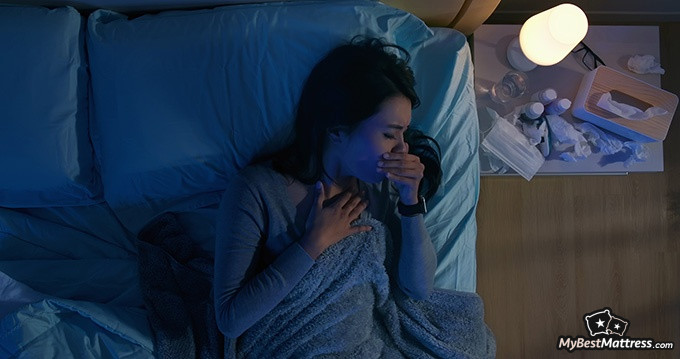
This rule translates to learning how to sleep with a cold as well. While it’s not recommended to go for walks or sit outside if you’re sick, it can do you a lot of good to try sticking to the regular schedule you had before coming down with a bug.
This will help your internal clock from getting out of balance, helping you fall asleep more easily when your usual bedtime comes.
That being said, what other tricks can you try while figuring out how to sleep with a cold?
How to Sleep With A Cold - Best Tips
Whether you are down with the seasonal common cold, the dreaded Coronavirus, or are just feeling under the weather, figuring out how to sleep with a cold-like sickness can be a long sequence of trial and error.
However, there are some things you can do that will not only help you when you’re sick and can’t sleep, but will also make the healing process much faster and easier.
Keep Yourself Warm
This is pretty much a no-brainer, as seeking out warmth while shivering from a fever is almost instinctual, however, this can be one of the simplest and most effective ways that you can try when wondering how to sleep with a cold.
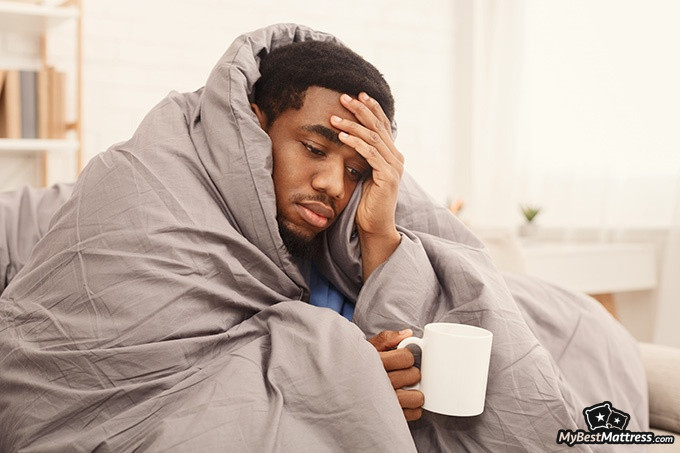
A hot water bottle can be great to cuddle with at night and warm duvets can help you relax even more, making it much easier to doze off.
This is more than enough if you don’t have enough energy to do much else, as all you need to do is just relax and sink into the warmth surrounding you. That being said, if you can take a hot shower or bath, the effects can be much more noticeable.
Keeping warm is crucial to fighting off any bug, whether it’s a virus or just the sniffles. This is largely due to the key immune system proteins, interferons, that need warmth in order to successfully fight off illnesses.
Research conducted by Akiko Iwasaki, an Immunology Professor at Yale, found that cooler temperatures (lower than the average body temperature of 37℃) left interferons impaired and less effective[3] in fighting off infections.
Additionally, the common cold virus thrives in lower temperatures, which is why flu season begins once cold temperatures start settling in.
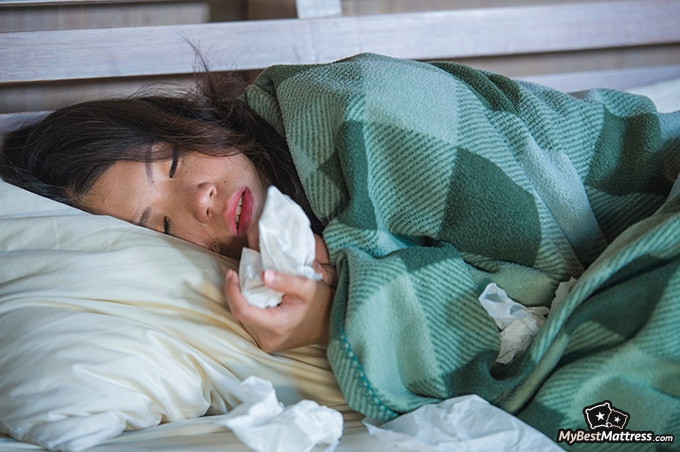
If you seemingly can’t stop shivering even under five comforters, it might be beneficial to consider investing in a heated blanket. They can offer consistent temperature control and additional comfort for those chills and aching muscles, which will undeniably speed up your recovery!
Any way you can keep yourself toasty is going to do you a lot of good, so turn on that hot shower, pile on those blankets, and maybe even enjoy a cup of steaming tea.
Stay Well Hydrated
Whether it’s tea, chicken soup, or just good ol’ water, staying well hydrated is absolutely crucial to your healing process.
On average the human body needs around 2-2.5 liters of water every day. Having a cold or any other similar viral infection can effectively double that number. Even though it can seem like an obscene amount of water, you don’t need to worry about camping by the bathroom. When sick, our bodies lose a lot of water through sweating, mucus, and other immune responses, which can quickly leave us dehydrated, even if we might not feel it.

Keep in mind, however, that not all liquids are the same. Your body needs water, not colorants, sweeteners, and caffeine. It’s best to stick to still water, clear broth, herbal and caffeine-free tea, and, if you’re looking for extra vitamins, freshly squeezed juices are a delicious and natural way to boost your immune system and increase your chances of getting better quicker.
If you’re more partial to warm liquids, some herbal teas are known for accelerating healing for a cold or flu:
- Peppermint. Containing menthol, peppermint tea is perfect for soothing an irritated throat, as well as providing the needed warmth to fight off any viruses lingering in your body. In addition, peppermint has been found to help with many other cold symptoms, such as congestion, coughing, and even inflammation, making it the ideal warm beverage for mastering how to sleep with a cold.
- Chamomile. When you’re sick and can’t sleep you often don’t know which front to tackle first. Well, that’s where chamomile tea comes in. Best known for its sleep aid properties, the herbal tea can be used as an all-natural anti-inflammatory remedy as well. So you would be killing two birds with one stone!
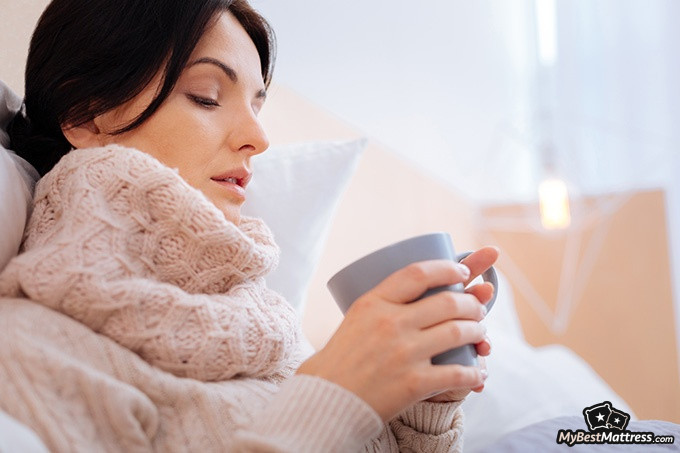
- Ginger. Whether on its own or with a spoonful of honey mixed in, ginger tea is one of the best natural brews to help fight off any viral infections. Containing properties that can soothe many symptoms, such as a sore throat, congestion, inflammation, and even helping get rid of nausea, ginger tea is an absolute must-have for every flu season.
These brews are all free of caffeine, so the only way they might keep you up at night is if you drink too many cups right before going to bed.
That being said, as important as it is to drink enough while sick, there are more ways to make sure your body is properly hydrated.
One such way is using a humidifier. While sick with a cold our airways tend to dry out, becoming irritated and raw, which can be worsened even more by breathing through your mouth due to congestion.
Sometimes, in less severe cases, a hydrating nasal spray can be enough to soothe your nasal airways. However, if the irritation reaches lower into the trachea, more measures should be taken.
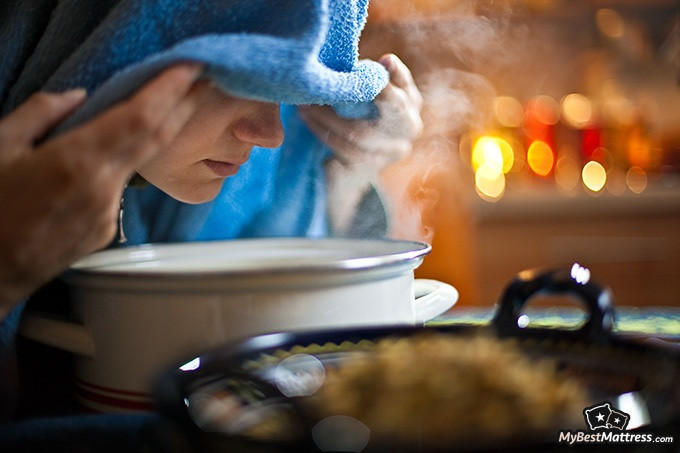
Now, if you don’t have a humidifier, worry not. Breathing in warm steam, like during a hot bath or while keeping your head over a bowl of hot water, can help hydrate the irritated airways. And, to add to that, warming yourself from the inside can encourage a quicker recovery by stopping the virus from thriving.
That being said, however, warm steam therapy might not be the perfect option for those wondering how to sleep with a cold, as it’s not exactly possible to sleep in a room full of steam all throughout the night. That is, unless you have a chance to sleep in a sauna.
To those of us without such luxury, a humidifier is the next best thing. Filling the air in your room with a gentle mist can work wonders for those irritated airways. The particles help restore the necessary moisture in your respiratory system, as well as effectively alleviates congestion.
This can be especially helpful if your stuffy nose is on the stubborn side, which seemingly only tends to get worse at night.
Find a Good Sleeping Position
You’ve probably already familiar with the sleeping positions that make your congestion that much worse, with sleeping on your back, as mentioned previously, being the worst offender.
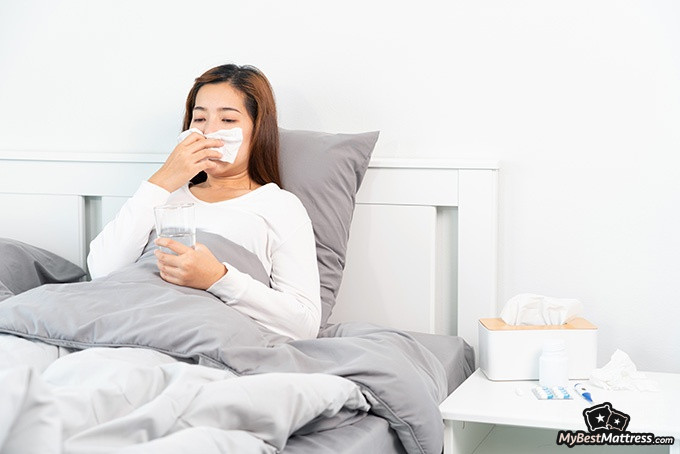
Even though plopping yourself on your back can often be all you could muster after a whole day of dealing with the discomfort of being sick, it’s far from the ideal sleeping position if you want to know how to sleep with a cold.
It’s most recommended to sleep slightly propped up, helping alleviate some congestion and making a coughing fit much less likely. Additionally, sleeping on your side can help better deal with a stuffy nose at night, however, this doesn’t help much in case of having a wet cough, as mucus pooling to one side of the lung airways can cause excessive coughing, preventing you from having some shuteye.
If you can, try sleeping sitting upright, as it can help keep your airways open and avoid excessive coughing fits and congestion. If done right, sleeping sitting up can be more comfortable than you might think. All you need to know are these simple tricks.
Over-the-counter Remedies
Naturally, sometimes home remedies can end up not working as well as you would like, leaving you looking for anything that would make sleeping with a cold at least a little bit easier.
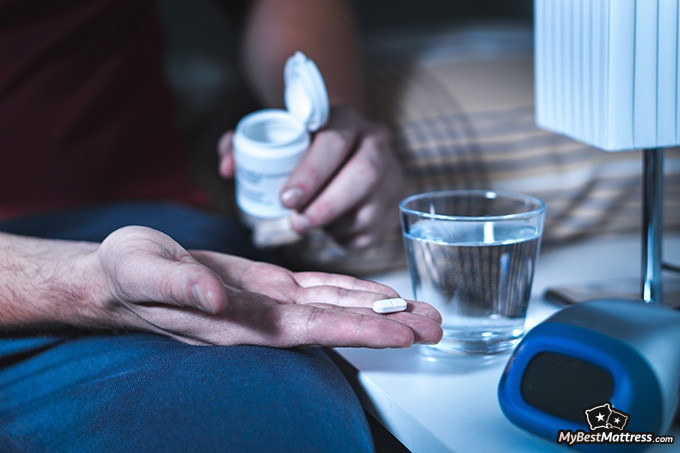
While taking medication isn’t everyone’s favorite pastime, it might be inevitable if nothing else is working, as getting enough sleep is crucial while down with a virus.
The most common non-prescription cold medication ingredients to look for are:
- Aspirin;
- Ibuprofen;
- Naproxen.
These are the top choices when it comes to getting rid of headaches, fever, and muscle pain, making falling asleep at night at least a little bit easier.
Whichever medication you choose, it’s always important to use them safely and according to the proper dosage, as taking over the recommended amount can lead to more harm than good.
Don’t Pressure Yourself
“I have a cold and I can’t sleep” you complain to yourself as you lay frustrated in bed in the middle of the night, trying to get some rest, yet your body still is not cooperating even after trying every trick in the book to help yourself fall asleep.
As discouraging as it might sound, but sometimes it’s ok to go with the flow and not force yourself into sleep for hours on end. This might be happening for several reasons, one of them being your sleep schedule messing up due to the multiple common cold naps you were most likely taking throughout the day.
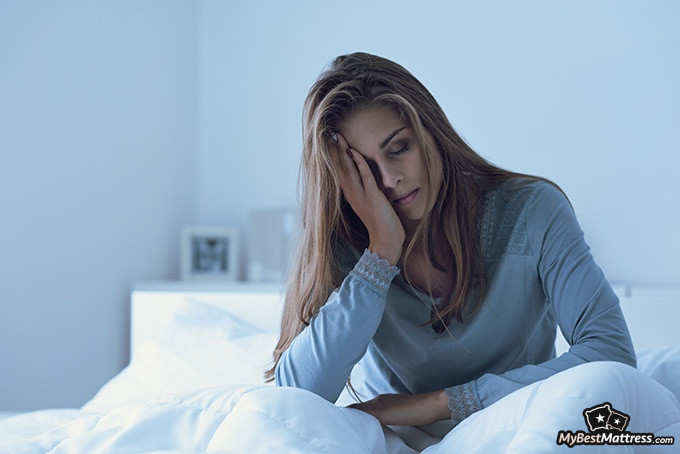
That is nothing to worry about and should not be fought against, as it would just leave you more frustrated. Get out of bed - still bundled up for warmth, of course - and occupy yourself with some relaxing activities. Try reading a book or listening to some music, maybe put on the newest episode of your favorite podcast.
It is, however, recommended to avoid screens, as too much stimulation can rev your mind up and make it even more difficult to fall asleep, having the exact opposite of the desired effect.
In the end, it’s crucial to remember that overstressing and worrying about not being able to fall asleep will only make it that much harder. Riled-up emotions and heightened stress levels are not your friends when you’re trying to rest and recover from cold-like infections, so it’s best to try and worry as little as possible.
With that said, however, there are some additional methods that can notably improve your quality of sleep, even if you are not down with any sort of illness.
How to Sleep With A Cold - Top Alternatives
While learning about how to sleep when sick, many of us are ready to try anything. After all, when you’re sick and can’t sleep, exhaustion can encourage you to try even the weirdest hacks.
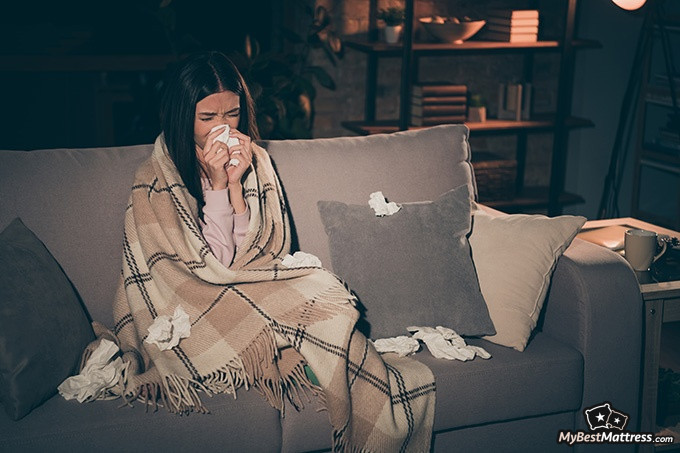
But don’t worry, you won’t need to sleep under your bed or drink a brew of 50 different spices just to get some rest. There are many simple tricks you can do that will help your body relax at night and finally start the healing process.
Comfortable Bed
When you’re aching all over and it feels like your bones are breaking, the last thing you would want to do is sleep on an old, lumpy mattress, with a rusty spring just waiting to poke you in the back, and a pillow that feels more like a bag of rocks than something to comfortably rest your head on at the end of the day.
Ok, that might have been a bit of an exaggeration. However, an uncomfortable bed can make your recovery process much longer than it should be.
Firstly, it’s common sense to want to sleep on a mattress and pillow that help alleviate some of the muscle aches, or at least not make them worse. A memory foam mattress is one of the best choices as it allows support and comfort in any sleeping position, whether it’s on your side or sitting upright.
If you suspect that your current mattress isn’t going to survive another flu season, it might be time to start looking for a replacement. Puffy offers one of the best memory foam mattresses currently available. And with a lifetime warranty, you can be sure that you are getting nothing but the highest quality!
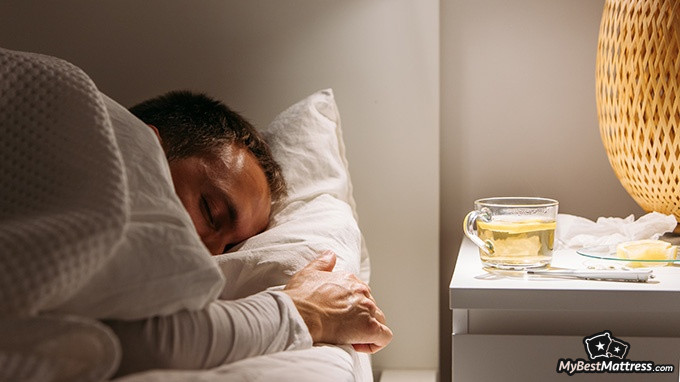
When it comes to pillows, it would be ideal to sleep with several stackable ones for maximum comfort and head support, as a drooping head can encourage your coughing to get much worse, making sleeping with a cold almost impossible.
To those looking for great neck support in any sleeping position, Saatva is the way to go. Offering the classic variant, down alternative, and even a memory foam option, Saatva is a favorite among many sleepers.
Even though it might seem like an exceptionally simple and maybe even unrelated tip, a comfortable place to rest can be a deciding factor when it comes to your recovery. And let’s be honest - who wouldn't want to sink into a cloud-like bed after a long day?
Peaceful Environment
I’m not sure about you, but when I have a cold and can’t sleep, the last place I want to be is a loud environment full of bright lights. Let’s be honest, learning how to sleep when sick is not going to be easy when your room is not prepared for a night of rest.
One of the most important things when trying to sleep with a cold is a dark room. We’re all familiar with how much your eyes can hurt while sick, and bright lights are definitely not going to help get rid of the pain.
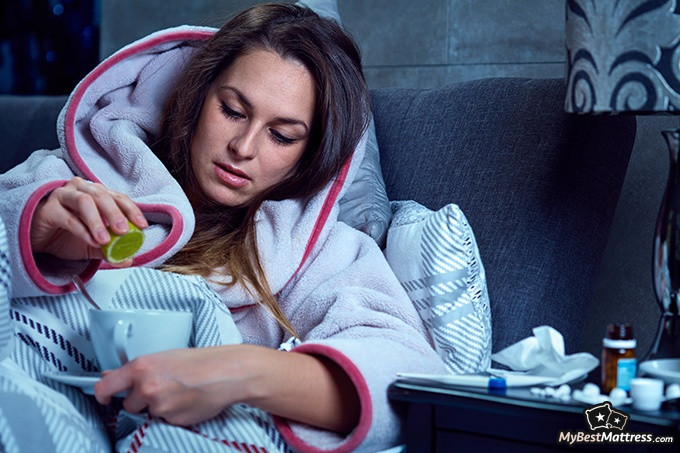
Eye strain, and especially from screens, should be avoided as much as possible while dealing with any cold-like sickness, as it can only lead to headaches and sore eyes.
If you don’t have blackout curtains you might want to consider a sleeping mask. For those long nights with a cold a warm mask might not be the best idea, as sweat and heat can irritate your eyes even more.
That’s where the Alaska Bear sleep mask comes in. Made of silk and delightfully breathable, this mask is perfect for relaxing your sore eyes at night. And, of course, it blocks out unwanted light, making falling asleep and resting well much easier.
Conclusions
Colds and viruses are never enjoyable. Well, it used to be exciting to stay home from school, but now we usually just end up grumpily googling how to sleep with a cold for hours.
When it comes to figuring out how to sleep when sick, there are many things to keep in mind, however, minimizing your symptoms such as a cough, stuffy nose, and aching muscles will make dozing off much easier.
Restful sleep is undeniably important at all times, not just while trying to recover from an infection, so when figuring out how to sleep with a cold you should always think about your comfort as the most important factor. So make sure you are as comfortable in your bed as possible, as this will drastically improve your sleep quality in the long run.
At the same time, keep in mind that there are more natural sleeping aids that many claim to help them sleep right through the night!
I hope that this article was useful and next time you’re under the weather you will know exactly how to have a good night of sleep while sick. I wish you the best of luck and a cold-free flu season!
Scientific References
1. Li DJ, Ko NY, Chen YL, et al. 'COVID-19-Related Factors Associated with Sleep Disturbance and Suicidal Thoughts among the Taiwanese Public: A Facebook Survey'
2. Gooley JJ, Chamberlain K, Smith KA, et al. 'Exposure to room light before bedtime suppresses melatonin onset and shortens melatonin duration in humans'
3. Iwasaki A. Foxman EF, Storer JA, et al. 'Temperature-dependent innate defense against the common cold virus limits viral replication at warm temperature in mouse airway cells'
Leave your honest feedback
Leave your genuine opinion & help thousands of people to choose the best mattress. All feedback, either positive or negative, are accepted as long as they’re honest. We do not publish biased feedback or spam. So if you want to share your experience, opinion or give advice - the scene is yours!





